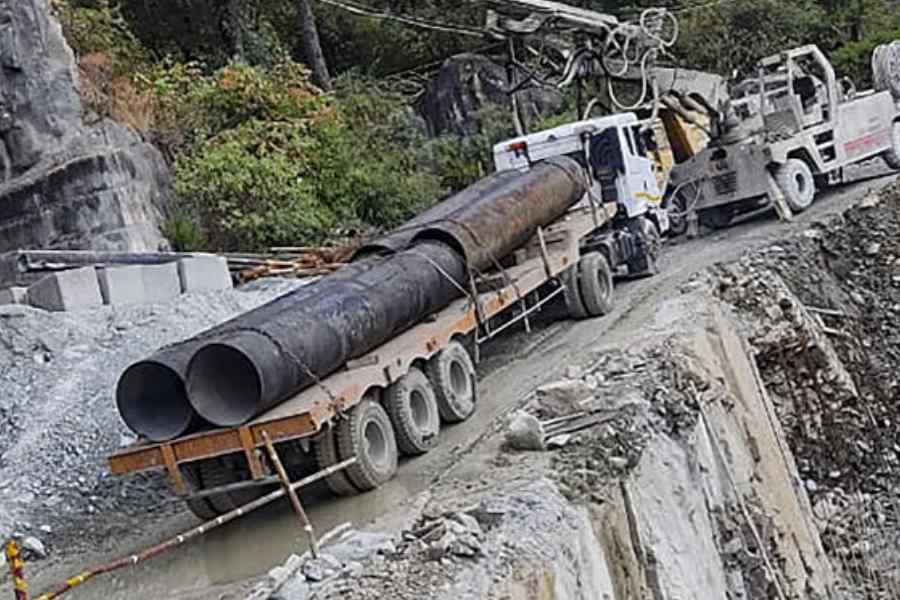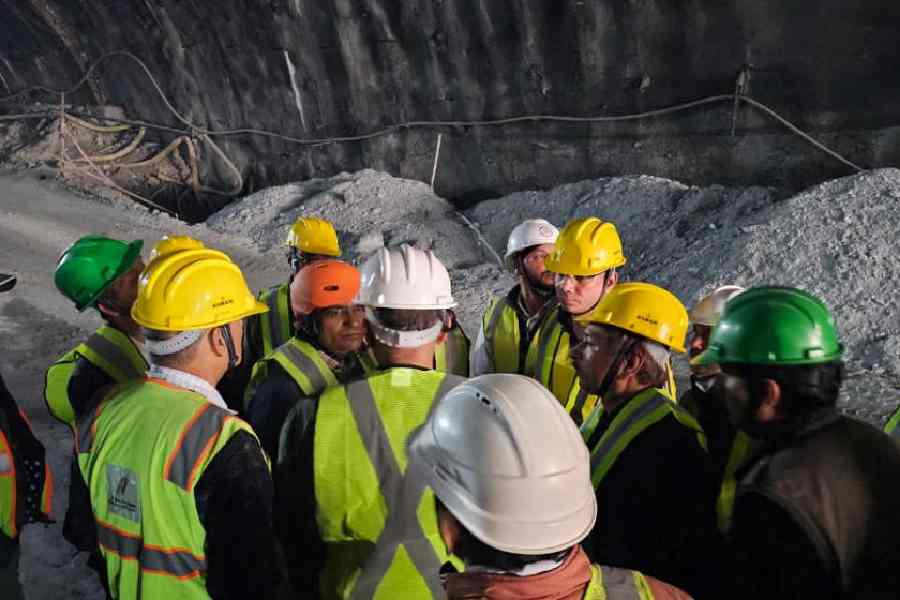Gowardhan Negi has been trapped in a mountain tunnel for over 60 hours along with 39 others but his spirits are not flagging.
Negi, the night-shift supervisor of the construction workers who are trapped inside a subsidence-hit Uttarkashi tunnel since 5am on Sunday, told his son through a water pipe on Tuesday that everyone was fine.
“I put my mouth on one end of the water pipe and asked him about his well-being. He replied he was fine. We both had to speak loudly so that our voices reached each other. His voice was not very audible but I heard him asking me to tell family members of the others that everything was fine. He said it would take time before they would be able to come out of the tunnel,” Negi’s son Akash, a resident of Kotdwar, 250km south of Uttarkashi, told reporters outside the tunnel. The father and son spoke during a brief period when the water pipe was not being used to send in oxygen, food packets and water with the help of a compressor machine.
A 60-metre stretch of the under-construction tunnel meant to cut the distance between Gangotri and Yamunotri by 25km collapsed on Sunday morning when the labourers were working there.
On Tuesday, rescue workers began to drill pipes into the caved-in area and weld them to create one long passage for the labourers to wriggle out.
For the past two days, the rescuers had been trying to remove the debris to reach the labourers, but more debris from loose rocks above would come rushing down and block the path. The labourers can be reached from one end of the tunnel as the other portion is yet to be constructed.
Arpan Yaduvanshi, superintendent of police of Uttarkashi, had said on Sunday that 36 labourers were stranded but later clarified that there were 40 names on the register at the entry gate. They include 15 from Jharkhand, five from Odisha, four from Bihar and two from Assam.
On Tuesday, the rescuers brought steel hume pipes and began drilling them into the 60-metre stretch of the collapsed and blocked tunnel, which will connect Silkyara and Dandalgaon villages. As one pipe is close to being drilled into the blocked portion of the tunnel, another pipe is welded to it, in the process creating a long passage that would cover 60 metres and reach the labourers.
“Drilling one pipe of 900mm diameter and 4m length takes a minimum of one hour under normal circumstances. But here there are big rocks amid the debris and breaking them into small pieces and removing the muck is taking time. Expect good news after 24 hours in a normal situation,” a source in the Uttarakhand government said.
Chief minister Pushkar Singh Dhami said: “It will take time to connect the hume pipes and drill them through the debris. We are sending everything, including water and food, to the trapped labourers.” The items are being sent through the water pipe, which has been cut at the region from where the subsidence has begun so that it is easier to use the compressor machine.
The labourers had gone inside the tunnel in a small truck. There is electricity supply inside the tunnel.
Palani Muthu, who is part of the team that is drilling the blocked area, said: “We have been told that the subsidence has happened over 60 metres. The drill machine is removing the debris and pushing the hume pipes inside to create an escape passage for the trapped people. Let us see how much time it takes.”
Muthu said he had executed a similar operation in Himachal Pradesh a few years ago. “There were 25 people trapped in that tunnel. However, there we had made a vertical escape passage because there was no hill. Here we only have the option of making a horizontal passage because there is a hillock above,” he said.
A temporary medical camp has been set up near the tunnel to attend to the labourers when they are brought out.
R.C.S. Panwar, chief medical officer of Uttarkashi, said: “While the rescue teams are supplying oxygen, water and food (biscuits, gram, almond and glucose) through a water pipe with the help of a compressor, we have also sent medicines for headache and fever. We have also set up a hospital near the entry point of the tunnel to provide every kind of medical assistance to the workers when they are rescued and brought out. A medical team and 10 ambulances are at the spot.”
The project was initiated by the ministry of road transport and highways five years ago under the all-weather connectivity programme of the central and state governments in the hill state. The tunnel-building work has been being assigned to M/S Navayuga Engineering Company Limited through the National Highways and Infrastructure Development Corporation Limited.
Ranjeet Kumar Sinha, the secretary of the Uttarakhand State Disaster Management Authority, stated in a media release that they had formed a six-member committee under the deputy director of the Geological Survey of India to “study and probe the landside in the under-construction tunnel”.
Sources said there had been water seepage for many days in the area where the tunnel collapsed. Experts said the Bandarpuchh Mountain Range of the Himalaya below which the tunnel is located is made up of phyllite rock, which is soft and easy to break. The seepage may have caused the rocks to become more brittle, triggering the collapse, the experts said.
B.D. Joshi, a geologist in Uttarakhand, said: “One should be very careful while doing any construction work in the hills of Uttarakhand, which are made of soft rocks. These are young hills compared to the ones in other states. Muck will start falling the moment you remove support from under them. There is also the pressure of natural water resources on the structures created in the hills.”












